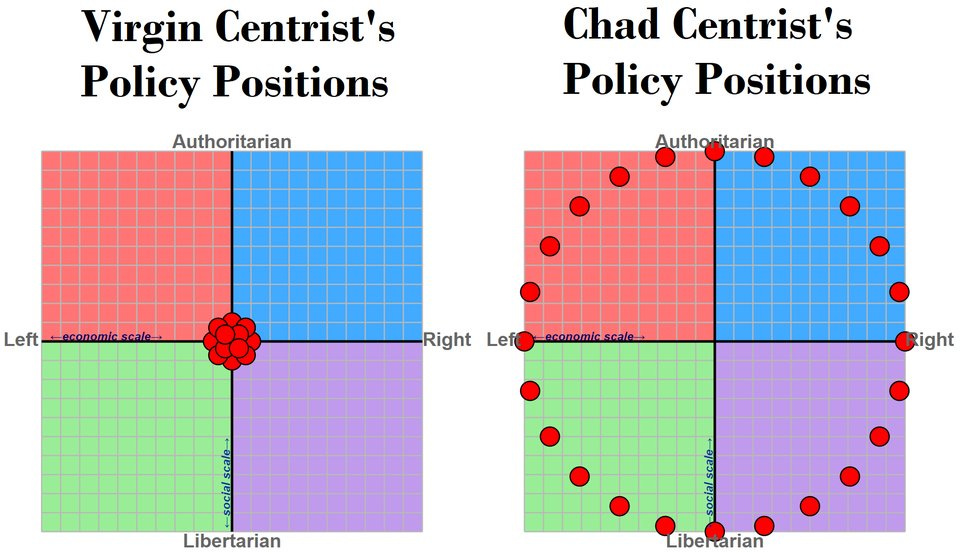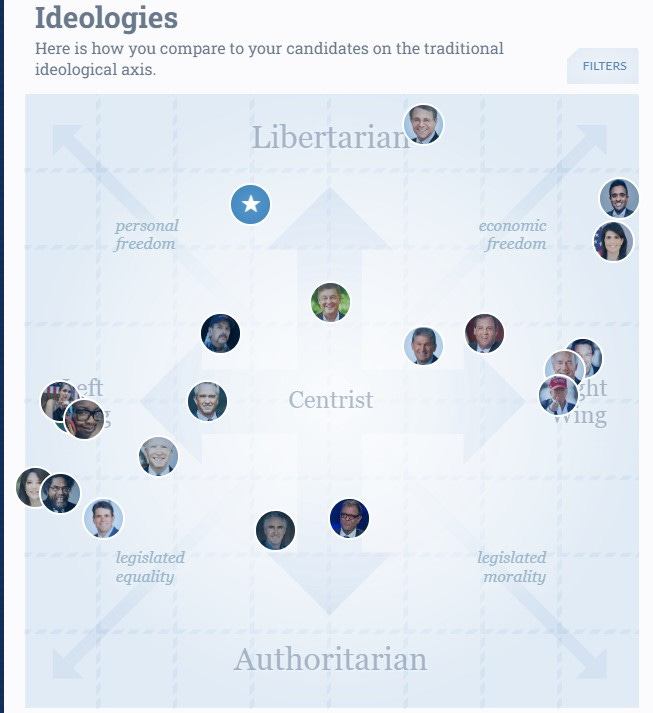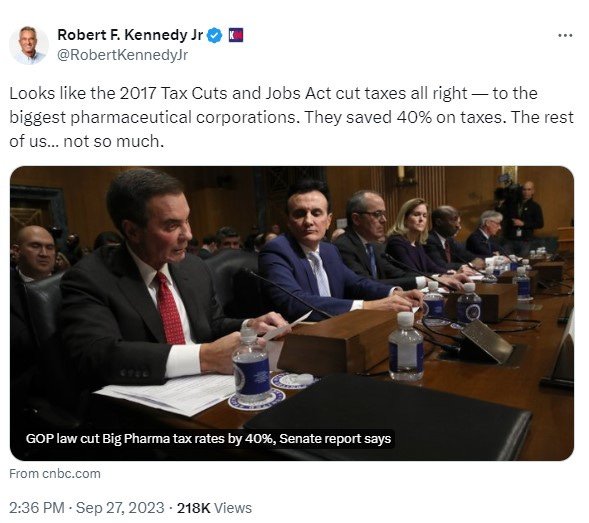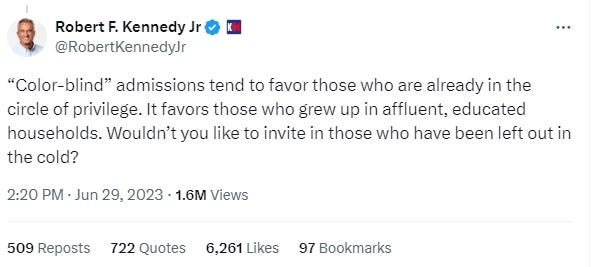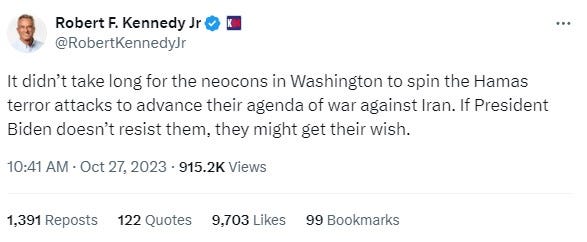The Aristocratic Populist Centrism of Robert F. Kennedy Jr. (Part I), by Robert Stark
While you could say that Robert F. Kennedy Jr. is an old school Democrat, he takes bold anti-establishment positions that go beyond just being a Social Democrat. Social Democrats tend to believe in centralized power and strong institutions while RFK jr. seems more sympathetic to decentralization. Regardless, the old school left is almost treated as rightwing, as old left values are very much at odds with the current Democratic Party, which RFK jr. would say has transformed into something unrecognizable from that of his father and uncle. He emphasizes that his values are in line with theirs. A Kennedy liberal is a pro-free speech, environmentalist, who is skeptical of corporate control over government.
Detractors have dismissed RFK jr. as a 90s/00s center-left Democrat who adopts some kooky conspiracy theories to win over the Right. While I reject that view, he has endorsed establishment Democrats, including Hillary Clinton against Donald Trump and campaigned for Obama. While there is valid criticism of him not overtly opposing the Democratic establishment until the election of Biden, it is the recent transformation of the Democratic Party that forced him to go independent. It could have been that he saw Democrats as better on the environment, which is his signature issue.
The contemporary Democratic Party is basically divided into two main camps, the woke progressive left and the corrupt neoliberal establishment, both of which are terrible. The current Democratic Party has no room for the kind of center-left populism that RFK Jr. represents, and was even quite common in the recent past. Other politicians who represented that kind of center-left populism, included Tulsi Gabbard and Jim Webb, though Bernie Sanders and Marianne Williamson are significantly to the left of RFK jr.
Trump initially seemed to be a sort of populist centrist, but once elected shifted in a more conventionally conservative direction, deregulating corporations and dramatically increasing the military budget. In contrast, RFK jr. wants to cut back the scope of the military industrial complex. RFK Jr. has immense crossover appeal, that few other candidates have in this age of polarization. On James Howard Kunstler’s podcast, RFK jr. said that a left-right populist coalition is the only thing that can save America.
RFK jr. has broad appeal to independents voters. His core demographic of support are the Obama to Trump and Sanders to Trump voters, who represent that populist center, broadly anti-establishment rather than left or right. These are generally working class Whites, who might be center-left on economics but center-right on racial and cultural issues. RFK jr. has appeal to those who supported Tulsi Gabbard and Andrew Yang’s campaigns, disillusioned former Trump supporters, Libertarians, and disillusioned Boomer, old-school Democrats, who backed mainstream Democrats in the past and have an affinity for the Kennedy family.
RFK Jr. has taken some more conservative positions, such as border security and defending the 2nd Amendment, though even Bernie Sanders initially opposed certain gun control legislation and called open borders a Koch Brothers conspiracy. RFK jr. is also going after Biden on progressive issues like corporatist policies favoring the wealthy, civil liberties abuses, and warmongering. While ironically Biden and RFK jr. are close on the political compass, I suppose you could say that RFK jr. is simultaneously to the right and to the left of Biden. He is also a lot more intellectually interesting and willing to talk about a wider variety of issues than either Bernie or Trump.
Source: isidewith.com
RFK jr. is calling for ending the corrupt merger between State and corporate power,’ which has ruined the economy and middle class. Basically socialism for the rich but brutal merciless capitalism for the poor and middle class. He blasted the lockdowns as the biggest wealth transfer in history. The progressive Democrat solution is more power to centralized bureaucracy rather than directly empowering people, while Trump just wants to cut taxes for oligarchs and corporations. If anything, RFK Jr.’s economic views are in line with Distributism, as well as agrarian Jeffersonian populism, which can appeal to both left and right populists. In an interview with libertarian, ReasonTV, RFK Jr. emphasized the importance of protecting the distinction between the commons and individuals/private property, and against total privatization.
RFK Jr. denounces the corruption of the Federal Reserve and its persecution of banks that partner with crypto businesses. He is pro Bitcoin on decentralization grounds, and is against the CBDC. He is also outspoken against Wall Street corruption and monopolies, like BlackRock. In contrast, Trump did little to fight corruption on Wall Street. On healthcare, he is actually pivoting to the center, but populist center rather than neoliberal. For instance, he is for a public option but also emphasizes choice in healthcare, thus against nationalizing healthcare. He is critical of Obamacare for lacking price caps and also emphasizes healthier lifestyles and food.
RFK Jr. is a lot closer to the center on economics than Bernie, though his fiscal outlook is in line with the old left position of raising taxes on the wealthy to fund social programs. However, he is against Modern Monetary Theory, which he blames for inflation and increasing income inequality. He is also critical of the Fed raising interest rates and agrees with conservatives that fiscal responsibility is key to fighting inflation. He does not want to raise overall taxation, as it would harm the economy, but rather shift the tax burden from the middle class to the top bracket.
There is a lack of honesty about the shape of the economy and RFK jr. calls out the terrible economy under both Trump and Biden. While Trump’s economy was better than Biden’s, like with Bidenomics, Trump used the same propaganda about the GDP, stock markets, and employment stats, which masks major economic vulnerabilities, income inequality, and overall hardship.
RFK Jr. is very concerned that millennials will never be able to own homes, and the implications of the transition from an ownership society to a rentier society, where the young have no stake in society. He is proposing using low interest rates tied to treasury bonds to help millennials get into homes. However, treasury bonds are volatile and low interest rates could inflate the cost of housing without increasing supply. Regardless, his proposal is a gateway to anti-usury and public banking, which is good.
Accomplished as an environmental attorney, RFK jr. is anti-trust on big agriculture, as well as against factory farming and technocratic control over food production. For instance, he sued the pork production monopoly, Smithfield. In contrast, Trump was in with Big Ag, which is one of the big industries that favors Republicans. The Democratic Party’s environmentalism amounts to soulless bureaucrats managing carbon credits, while conservatives flat out reject environmentalism as leftwing. RFK jr. frames environmentalism in patriotic terms, in line with Teddy Roosevelt conservationism, as well as his love of the outdoors, an appreciation of beauty, and even a spiritual element.
RFK jr.’s death penalty for climate deniers was taken out of context by conservatives, as he was talking about Koch Brother NGOs. He is right that corporations that do tremendous harm to the environment should lose their corporate charters, which should also apply to corporations that censor dissent and subvert national sovereignty.
Source: @RobertKennedyJr on X
On covid lockdowns, RFK jr. actually attacked Trump from the right. While some of his statements sound anti-vaxxer, there is a lot of nuance and his opponents never bother to debate him. I am not an anti-vaxxer, but there is a lot of corruption, profit motives, and lack of oversight in the pharmaceutical industry, which is an old school left stance. Not to mention the vaccines were rushed due to the emergency and covid was used to justify blatant authoritarianism. Also his statement on race specific bio weapons was taken out of context, as he was citing a study and talking about a scenario which could hypothetically happen.
RFK jr.’s immigration stance is that amnesty should not be considered until the borders are closed. He also has a strong emphasis on the humanitarian angle and seems to be pro-legal immigration. I wouldn’t say he is rightwing on immigration but more in line with the standard centrist Democrat or Republic position from the 90s/00s. It is just that the Overton Window on immigration has moved so far to the left, and he is certainly way to the right of Biden on immigration. However, he is probably more liberal on immigration than Trump and for hardline immigration restrictionists.
Source: @RobertKennedyJr on X
RFK jr. is more liberal on race and civil rights issues, including supporting affirmative action, which is not surprising considering his father was a Civil Rights icon. He is certainly more liberal on race than that core populist centrist demographic that he needs. However, most of his agenda on race is about tackling Black poverty by investing in Black communities rather than DEI bullshit or penalizing Whites, like the Democrats do. However, I actually prefer his nobles oblige approach to race relations and class to Republicans vulgar worship of the blank slatist, capitalist meritocracy. Not to mention, not even Trump would come out in favor of freedom of association.
Source: @RobertKennedyJr on X
My assessment is that he views Israel as good and just trying to survive while being exploited by US warmongers. Regardless, he is more non-interventionist, which is most important. The American consensus is pro-Israel, though there is a pro-Palestinian shift among the young and the Left. He is a boomer and most boomers are pro-Israel. It is just that much of the demographics open to his views on Ukraine and vaccines, are also more skeptical of Israel. While his pro-Israel stance may cost him some support, a lot of pro-Palestinian types still might vote for him as a protest against “Genocide Joe.”
On Ukraine, he is good at striking a balance between showing compassion for Ukrainians, as victims of a proxy war, while also criticizing the war effort. He has also avoided coming across as too sympathetic to Putin, as Tucker Carlson and Tulsi Gabbard have, even if they have been unfairly smeared. He also has credibility on Ukraine, skin in the game, since his son volunteered to fight for Ukraine. However, like Republicans, he views China not Russia as the US’s main adversary.
To be continued

